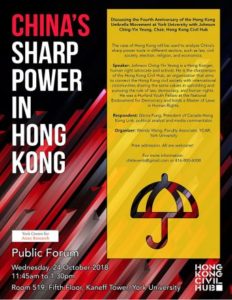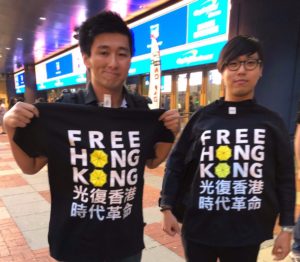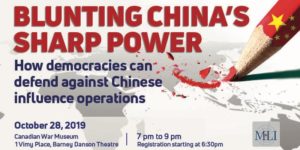 As the battle between the US and China over tariffs goes on, an age-old ideological feud is being waged, pitting Beijing’s Communist Party against Washington-style democracy. It’s not a fight for trade or for territory, it’s for hearts and minds, according to Tara McKelvey and Zhaoyin Feng.
As the battle between the US and China over tariffs goes on, an age-old ideological feud is being waged, pitting Beijing’s Communist Party against Washington-style democracy. It’s not a fight for trade or for territory, it’s for hearts and minds, according to Tara McKelvey and Zhaoyin Feng.
The term “influence operations” describes the way that government officials try to find out information about another country and also the way they attempt to sway the views of people who live there, according to researchers at the nonpartisan Rand Corporation. There are five areas where Americans and Chinese are promoting their own political and cultural ideas – and are facing pushback from the other side, they write for the BBC:
- Promote values through non-governmental organisations: Pro-democracy organisations are funded through the US National Endowment for Democracy and operate openly in China. Americans view these activities as “utterly benign”, according to Dartmouth College’s William Wohlforth. …”China views US democracy promotion as a strategic threat,” wrote Baogang He in Wilson Quarterly, and believe that the US officials are trying to isolate China “from Europe and elsewhere internationally – in part by consolidating US moral leadership”
 Use Twitter to influence people’s views: Chinese Ambassador Cui Tiankai said recently on Twitter that people should support the “One China” policy, which means Taiwan is part of China. He posted a stern warning against those who undermine the party’s position: “Those who play with fire will only get themselves burned.”
Use Twitter to influence people’s views: Chinese Ambassador Cui Tiankai said recently on Twitter that people should support the “One China” policy, which means Taiwan is part of China. He posted a stern warning against those who undermine the party’s position: “Those who play with fire will only get themselves burned.”- Shape opinion through radio broadcasts: China Radio International programmes are broadcast on radio stations such as WCRW 1190 in Leesburg, Virginia. Sarah Cook, an analyst at Freedom House, a pro-democracy nonprofit organisation in the US, says that the Chinese officials use these programmes as a way to soften criticism of their government….
- Influence people through newspaper articles: Kenneth Geers, a senior fellow at the Atlantic Council, a US think-tank, says Chinese officials attempt to “drive discussion” through English-language editions of state-run China Daily and Global Times. Articles may raise questions about US troops stationed in Japan and in this way, he says. “China can insert itself and affect what people are hearing.”…
- Showcase national culture through film: Robert Daly, the director of the Wilson Center’s Kissinger Institute on China and the US, says that through films, books and culture, the US has a presence in China. …In comparison, he says, the impact of Chinese culture on the US has been negligible. “It’s not even a fleabite,” he says, compared to “how China has been influenced by America”… ….RTWT

Victims of Communism
The Victims of Communism Memorial Foundation this week handed out “Free Hong Kong” t-shirts at the NBA preseason game between the Washington Wizards and the Chinese team Guangzhou Long-Lions. They were a hit, and you can get your own with a $15 donation here.
China’s Influence and Information Campaigns
Over the past six years, under the rule of Xi Jinping, China has radically overhauled and expanded its strategy to wield influence within other states’ domestic politics and societies. This strategy is most apparent in Asia-Pacific states near China, although it is also increasingly evident in North America, Europe, Australia, and New Zealand, the Taiwan Foundation for Democracy adds:
 This influence and information campaign is designed partly to bolster China’s power but also partly to undermine the space for rights and democracy in other states, and to potentially support pro-China authoritarian leaders. The campaign has had, and could have, a substantially negative impact on rights and democracy generally, and on the freedoms of democratic politicians, media outlets, and other civil society groups in Asian nations specifically. This seminar will explore how China’s influence and information campaign is affecting civil society, politics, and foreign policy in Taiwan and in other states.
This influence and information campaign is designed partly to bolster China’s power but also partly to undermine the space for rights and democracy in other states, and to potentially support pro-China authoritarian leaders. The campaign has had, and could have, a substantially negative impact on rights and democracy generally, and on the freedoms of democratic politicians, media outlets, and other civil society groups in Asian nations specifically. This seminar will explore how China’s influence and information campaign is affecting civil society, politics, and foreign policy in Taiwan and in other states.
 Panelists are Dr. Shih-hung Lo from National Chung Cheng University in Taiwan, Isaac Stone Fish from the Asia Society’s Center on U.S.-China Relations, David Shullman from the International Republican Institute, and Russell Hsiao from Global Taiwan Institute and a former Penn Kemble fellow at the National Endowment for Democracy. Carnegie Council Senior Fellow Devin T. Stewart will moderate the panel.
Panelists are Dr. Shih-hung Lo from National Chung Cheng University in Taiwan, Isaac Stone Fish from the Asia Society’s Center on U.S.-China Relations, David Shullman from the International Republican Institute, and Russell Hsiao from Global Taiwan Institute and a former Penn Kemble fellow at the National Endowment for Democracy. Carnegie Council Senior Fellow Devin T. Stewart will moderate the panel.
Wednesday, October 16, 2019 from 4:30 PM – 6:00 PM at the Global Taiwan Institute,
1836 Jefferson Place Northwest, Washington, DC 20036 View Map. Doors open at 4:00 pm, and the event will begin at 4:30 pm. Kindly RSVP by October 14. Please direct questions or concerns to rsvp@globaltaiwan.org.







